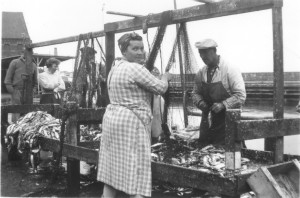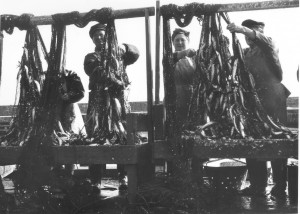Being a fisherman is not a game.
As the daughter of a Bornholm fishing family, I know how laboriously the fishermen of Bornholm work.
In the summer, for the most part, only herring is fished.
The boat sails out around 4pm and returns around 2am at night.
If the catch is large and the nets are full, the fishermen immediately head home to wake their wives and older daughters so they can help pull the fish from the nets. And that is actually what I want to tell you about.
 My father was a fisherman in Allinge.
My father was a fisherman in Allinge.When his boat returned in the middle of the night, he would come and wake me up with these words:
“We have a lot of herring today, Rigmor! Think you can hurry down and help a little with pulling them from the net?!”
In my drowsy state, I heard the words but thought they sounded so strange. I didn’t know whether to believe what I’d heard, but after collecting myself, I was completely awake and clothed.
I would then sneak down the steps in my stockings and into the kitchen for a bite to eat.
Once I was done eating, I would grab my herring apron and wooden clogs, which were always stored in the corner cabinet in the entrance hall.
In the quiet of the night, I made my way to the harbour - a couple minutes’ walk from home.
Whether it was because of the time of day, wooden clogs or my own sleepy state is difficult to say, but my legs felt so strange walking down that path.
Everything around me was sound asleep, and I heard the gentle lapping of the waves against the rocks.
The harbour, where I could glimpse a lively commotion underway, came nearer - slowly.
Soon after, I began to hear the voices. With a “good morning” reciprocated by several waking voices, I glided between the fishermen and their wives until I was next to my father, who hung up netting over the beam on the picking device for me.
It was a pleasure to see the herring fall quickly off the net and fill the basket.
But it’s not as easy as it would seem, for every single herring is stuck with its gills in a small mesh.
It requires a special movement of the fingers to avoid separating the herring from its head or ripping the net.
But practice makes perfect, and as the baskets slowly filled with herring, we talked of everything and nothing.
 We stood there as the hours passed. People out in the town began to emerge.
We stood there as the hours passed. People out in the town began to emerge.The came down to the harbour to talk with the fishermen, to hear how many herring there were and stand around for a bit to watch our fingers in action.
We could, in those early morning hours, end up feeling a little stiff; but that would subside as soon as the Sun rose and the night gave way to day.
It was actually quite a festive and special event if there were a lot of herring, because then our mother would make a coffee basket for us.
One of the younger siblings would bring it and fetch some 6 øre [Danish pence] pastries. Oh, how yummy they were.
By then, we were up to our arms in herring gills.
When the coffee arrived, we would pull a bucket of water from the harbour and wash ourselves clean.
The children would poke bout, have some pastries and a bit of coffee.
They would also gather up “kattasil” - herring that had fallen apart. And then they would run home with their mugs and herring.
We would finish sometime in the late morning, and I would be free to go home after doing the accounts with my father - regarding the working hours.
On the way home, my legs felt as they had on the way down to the harbour.
They were stiff from standing so rigidly for so long. But by now, the Sun was high in the sky.
It warmed and shined down on all the busy people of the town and the many strangers who were holidaying and strolling around the streets and on the beach.



